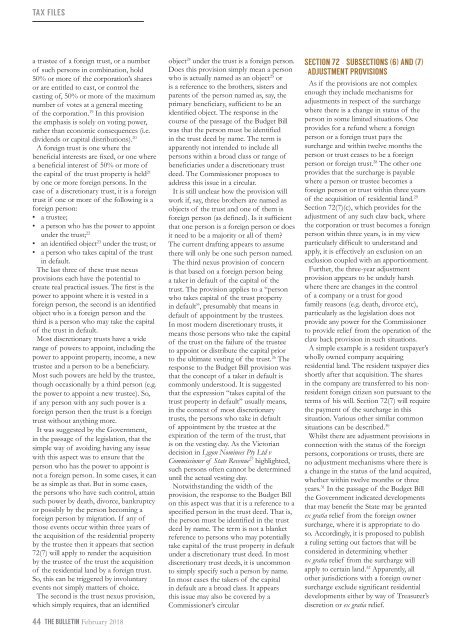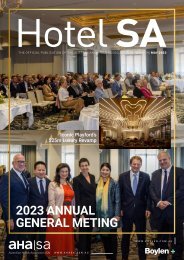LSB February 2018_Web_LSSA
You also want an ePaper? Increase the reach of your titles
YUMPU automatically turns print PDFs into web optimized ePapers that Google loves.
TAX FILES<br />
a trustee of a foreign trust, or a number<br />
of such persons in combination, hold<br />
50% or more of the corporation’s shares<br />
or are entitled to cast, or control the<br />
casting of, 50% or more of the maximum<br />
number of votes at a general meeting<br />
of the corporation. 19 In this provision<br />
the emphasis is solely on voting power,<br />
rather than economic consequences (i.e.<br />
dividends or capital distributions). 20<br />
A foreign trust is one where the<br />
beneficial interests are fixed, or one where<br />
a beneficial interest of 50% or more of<br />
the capital of the trust property is held 21<br />
by one or more foreign persons. In the<br />
case of a discretionary trust, it is a foreign<br />
trust if one or more of the following is a<br />
foreign person:<br />
• a trustee;<br />
• a person who has the power to appoint<br />
under the trust; 22<br />
• an identified object 23 under the trust; or<br />
• a person who takes capital of the trust<br />
in default.<br />
The last three of these trust nexus<br />
provisions each have the potential to<br />
create real practical issues. The first is the<br />
power to appoint where it is vested in a<br />
foreign person, the second is an identified<br />
object who is a foreign person and the<br />
third is a person who may take the capital<br />
of the trust in default.<br />
Most discretionary trusts have a wide<br />
range of powers to appoint, including the<br />
power to appoint property, income, a new<br />
trustee and a person to be a beneficiary.<br />
Most such powers are held by the trustee,<br />
though occasionally by a third person (e.g.<br />
the power to appoint a new trustee). So,<br />
if any person with any such power is a<br />
foreign person then the trust is a foreign<br />
trust without anything more.<br />
It was suggested by the Government,<br />
in the passage of the legislation, that the<br />
simple way of avoiding having any issue<br />
with this aspect was to ensure that the<br />
person who has the power to appoint is<br />
not a foreign person. In some cases, it can<br />
be as simple as that. But in some cases,<br />
the persons who have such control, attain<br />
such power by death, divorce, bankruptcy<br />
or possibly by the person becoming a<br />
foreign person by migration. If any of<br />
those events occur within three years of<br />
the acquisition of the residential property<br />
by the trustee then it appears that section<br />
72(7) will apply to render the acquisition<br />
by the trustee of the trust the acquisition<br />
of the residential land by a foreign trust.<br />
So, this can be triggered by involuntary<br />
events not simply matters of choice.<br />
The second is the trust nexus provision,<br />
which simply requires, that an identified<br />
44 THE BULLETIN <strong>February</strong> <strong>2018</strong><br />
object 24 under the trust is a foreign person.<br />
Does this provision simply mean a person<br />
who is actually named as an object 25 or<br />
is a reference to the brothers, sisters and<br />
parents of the person named as, say, the<br />
primary beneficiary, sufficient to be an<br />
identified object. The response in the<br />
course of the passage of the Budget Bill<br />
was that the person must be identified<br />
in the trust deed by name. The term is<br />
apparently not intended to include all<br />
persons within a broad class or range of<br />
beneficiaries under a discretionary trust<br />
deed. The Commissioner proposes to<br />
address this issue in a circular.<br />
It is still unclear how the provision will<br />
work if, say, three brothers are named as<br />
objects of the trust and one of them is<br />
foreign person (as defined). Is it sufficient<br />
that one person is a foreign person or does<br />
it need to be a majority or all of them?<br />
The current drafting appears to assume<br />
there will only be one such person named.<br />
The third nexus provision of concern<br />
is that based on a foreign person being<br />
a taker in default of the capital of the<br />
trust. The provision applies to a “person<br />
who takes capital of the trust property<br />
in default”, presumably that means in<br />
default of appointment by the trustees.<br />
In most modern discretionary trusts, it<br />
means those persons who take the capital<br />
of the trust on the failure of the trustee<br />
to appoint or distribute the capital prior<br />
to the ultimate vesting of the trust. 26 The<br />
response to the Budget Bill provision was<br />
that the concept of a taker in default is<br />
commonly understood. It is suggested<br />
that the expression “takes capital of the<br />
trust property in default” usually means,<br />
in the context of most discretionary<br />
trusts, the persons who take in default<br />
of appointment by the trustee at the<br />
expiration of the term of the trust, that<br />
is on the vesting day. As the Victorian<br />
decision in Lygon Nominees Pty Ltd v<br />
Commissioner of State Revenue 27 highlighted,<br />
such persons often cannot be determined<br />
until the actual vesting day.<br />
Notwithstanding the width of the<br />
provision, the response to the Budget Bill<br />
on this aspect was that it is a reference to a<br />
specified person in the trust deed. That is,<br />
the person must be identified in the trust<br />
deed by name. The term is not a blanket<br />
reference to persons who may potentially<br />
take capital of the trust property in default<br />
under a discretionary trust deed. In most<br />
discretionary trust deeds, it is uncommon<br />
to simply specify such a person by name.<br />
In most cases the takers of the capital<br />
in default are a broad class. It appears<br />
this issue may also be covered by a<br />
Commissioner’s circular<br />
SECTION 72 – SUBSECTIONS (6) AND (7)<br />
–ADJUSTMENT PROVISIONS<br />
As if the provisions are not complex<br />
enough they include mechanisms for<br />
adjustments in respect of the surcharge<br />
where there is a change in status of the<br />
person in some limited situations. One<br />
provides for a refund where a foreign<br />
person or a foreign trust pays the<br />
surcharge and within twelve months the<br />
person or trust ceases to be a foreign<br />
person or foreign trust. 28 The other one<br />
provides that the surcharge is payable<br />
where a person or trustee becomes a<br />
foreign person or trust within three years<br />
of the acquisition of residential land. 29<br />
Section 72(7)(c), which provides for the<br />
adjustment of any such claw back, where<br />
the corporation or trust becomes a foreign<br />
person within three years, is in my view<br />
particularly difficult to understand and<br />
apply, it is effectively an exclusion on an<br />
exclusion coupled with an apportionment.<br />
Further, the three-year adjustment<br />
provision appears to be unduly harsh<br />
where there are changes in the control<br />
of a company or a trust for good<br />
family reasons (e.g. death, divorce etc),<br />
particularly as the legislation does not<br />
provide any power for the Commissioner<br />
to provide relief from the operation of the<br />
claw back provision in such situations.<br />
A simple example is a resident taxpayer’s<br />
wholly owned company acquiring<br />
residential land. The resident taxpayer dies<br />
shortly after that acquisition. The shares<br />
in the company are transferred to his nonresident<br />
foreign citizen son pursuant to the<br />
terms of his will. Section 72(7) will require<br />
the payment of the surcharge in this<br />
situation. Various other similar common<br />
situations can be described. 30<br />
Whilst there are adjustment provisions in<br />
connection with the status of the foreign<br />
persons, corporations or trusts, there are<br />
no adjustment mechanisms where there is<br />
a change in the status of the land acquired,<br />
whether within twelve months or three<br />
years. 31 In the passage of the Budget Bill<br />
the Government indicated developments<br />
that may benefit the State may be granted<br />
ex gratia relief from the foreign owner<br />
surcharge, where it is appropriate to do<br />
so. Accordingly, it is proposed to publish<br />
a ruling setting out factors that will be<br />
considered in determining whether<br />
ex gratia relief from the surcharge will<br />
apply to certain land. 32 Apparently, all<br />
other jurisdictions with a foreign owner<br />
surcharge exclude significant residential<br />
developments either by way of Treasurer’s<br />
discretion or ex gratia relief.


















